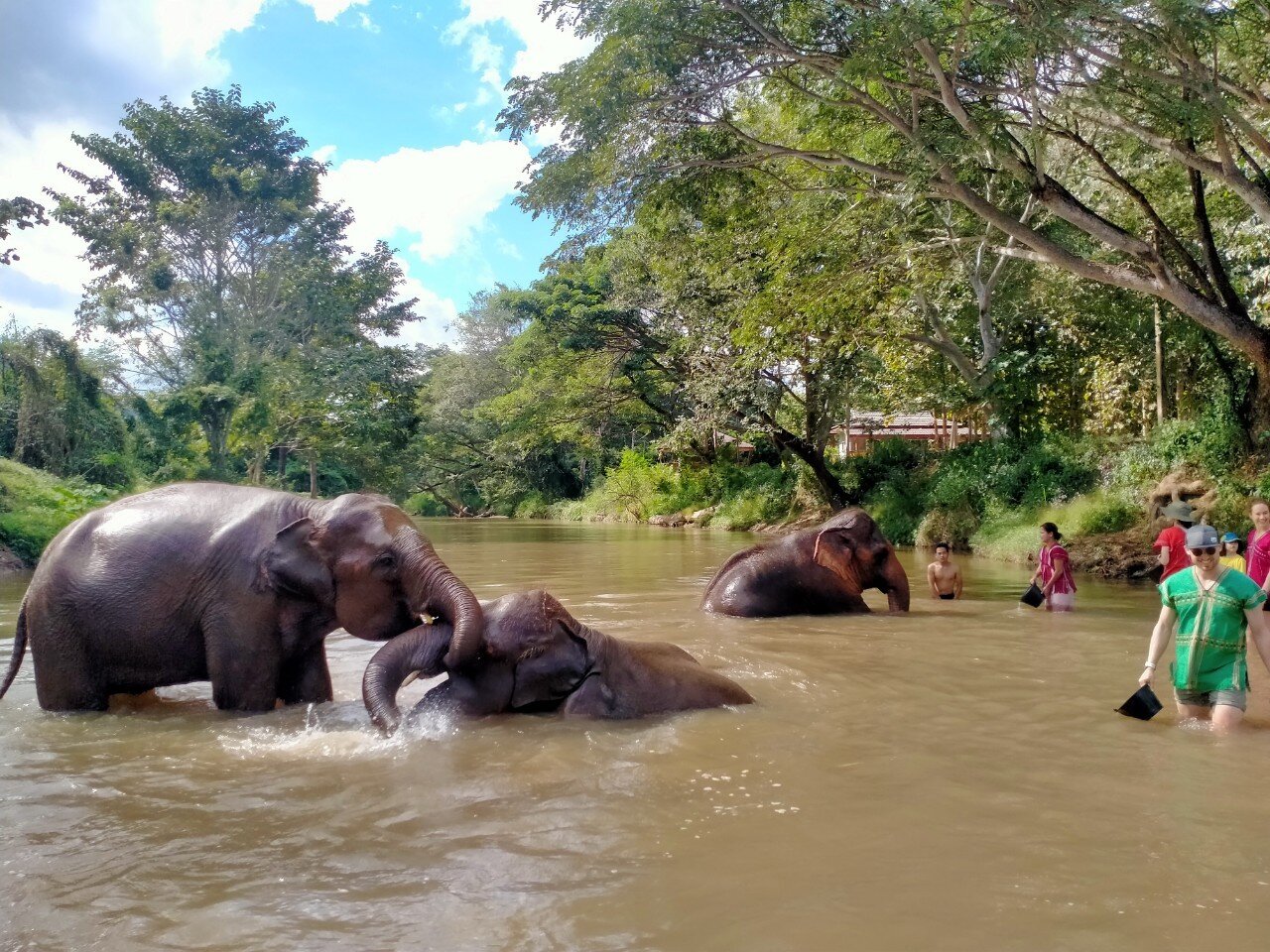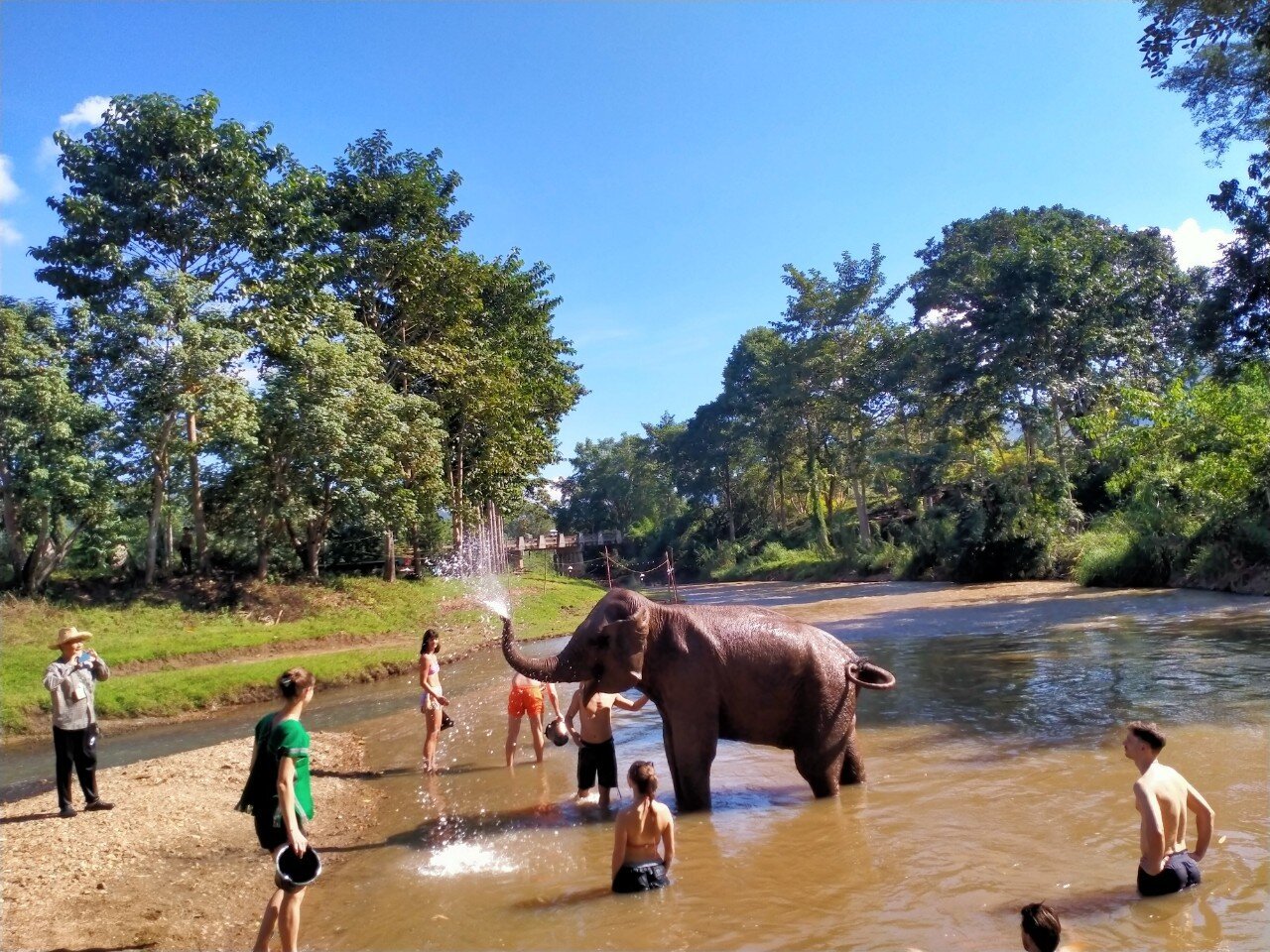News
A Guide to Choosing the Best Elephant Sanctuary in Chiang Mai

Chiang Mai, located in northern Thailand, is renowned for its unique culture and natural beauty. But its most famous attraction is the opportunity to interact with elephants ethically and responsibly through Elephant Sanctuary Chiang Mai.
Elephant sanctuaries in Chiang Mai offer visitors a chance to get up close and personal with these majestic creatures while supporting their conservation and well-being. With so many options available, choosing the best elephant sanctuary in Chiang Mai can be overwhelming. This guide will provide information and tips to help you make an informed decision.
Understand the Difference Between Elephant Sanctuaries and Elephant Camps
Before diving into the selection process, it is vital to understand the difference between elephant “sanctuaries” and “camps.” An elephant sanctuary in Thailand prioritizes the well-being and ethical treatment of elephants. They do not offer harmful activities like riding, performing tricks, or chaining elephants. On the other hand, camps are typically focused on entertaining tourists and may engage in practices detrimental to the elephants’ welfare.
Research the Elephant Sanctuary’s Background and Philosophy
When choosing an elephant sanctuary, it is essential to research their background and philosophy. Look for sanctuaries that have a solid commitment to conservation and elephant welfare. Check the Elephant Sanctuary reviews on Google, Trip Advisors, and other sources you deem credible. Ensure that their practices align with your values, such as a no-riding policy or a focus on freedom and natural behaviors for the elephants.
Conservation should be a key focus for any reputable elephant sanctuary. Look for sanctuaries that actively support conservation efforts and contribute to the protection of elephants in Thailand, including initiatives such as breeding programs, research, and rescue operations.
Observe Elephant Interaction Guidelines
Ethical elephant sanctuaries emphasize visitor education and follow strict guidelines for elephant interactions. They encourage observation from a respectful distance and limit the amount of direct physical contact. Elephants are social animals and need their space. If a sanctuary allows riding or enables too much close contact, it is a red flag that they may prioritize tourist satisfaction over elephant welfare.

Ask About the Elephant’s Origin and Journey
Responsible elephant sanctuaries prioritize the rescue and rehabilitation of elephants that have been subjected to exploitation or mistreatment. Please inquire about the sanctuary’s elephants and their individual stories. Find out if the elephants were rescued from circuses, trekking camps, or logging industries. Understanding their journey to the sanctuary will give you insight into the organization’s mission and commitment to ethical practices.
Evaluate the Living Conditions
Before deciding, visit the sanctuary’s website or contact them directly to inquire about the elephants’ living conditions. Ethical elephant sanctuaries provide spacious and natural habitats for their elephants, allowing them to roam, bathe, and socialize freely. Ensure that the sanctuary has a no-chaining policy and that the elephants have access to clean water, nutritious food, and appropriate medical care.

Health and Veterinary Care
Elephants in sanctuaries need proper health and veterinary care to thrive. Please inquire about the sanctuary’s veterinary practices and how they ensure the well-being of their elephants.
Responsible Tourism Practices
Choose a sanctuary that promotes responsible tourism practices. This includes limiting the number of visitors allowed in the sanctuary at any given time to minimize stress on the elephants and their habitat. Most responsible sanctuaries will limit the number of guests to each elephant. Look for a ratio of no more than five guests per elephant.
Assess the Volunteer and Staff Programs
Assessing the volunteer and staff programs is essential if you are considering a volunteer program or spending an extended period at an elephant sanctuary. Look for programs that provide comprehensive training to ensure the safety of both the elephants and the visitors. Ask about the qualifications and experience of the staff members and if they receive ongoing training in elephant welfare and behavior.

Encouraging Ethical Elephant Sanctuaries – Thailand’s New Push for Regulations
Another critical aspect of Thailand’s new regulations is the promotion of ethical elephant sanctuaries. These sanctuaries provide elephants with a safe and nurturing environment, allowing them to live freely and naturally. The two new regulations that make it apparent the Thai government is taking this conservation effort seriously are the requirements for veterinarian onsite care and easy access to water for the elephants at all times.
One of the most significant changes Thailand’s new regulations introduced is the elephant ride ban. Riding elephants has been a popular tourist activity in Thailand for many years. However, the practice has been widely criticized for its negative impact on the animals’ physical and mental health.
In addition to banning elephant rides and promoting ethical sanctuaries, Thailand’s new regulations also aim to strengthen legal protection for elephants. The government has introduced stricter penalties for those involved in the illegal trade of elephants and elephant products.
The Importance of Elephant Welfare
Elephants are crucial in Thailand’s tourism industry, attracting thousands of visitors annually. However, the demand for elephant tourism has come at a significant cost to the well-being of these animals. Many elephants in Thailand are subjected to harsh training methods, cramped living conditions, and physical abuse, all in the name of entertainment. Such practices have led to declining elephants’ overall health and happiness, sparking concerns from animal welfare organizations and activists worldwide.
Conclusion
Thailand’s new regulations to improve elephant welfare are a great step forward to ensuring the well-being of these magnificent creatures. The ban on elephant rides, the promotion of ethical sanctuaries, and the strengthening of legal protection all work together to create a more sustainable and compassionate approach to elephant tourism.
Selecting the best elephant sanctuary in Chiang Mai requires careful consideration and research. By understanding the difference between elephant sanctuaries and elephant camps, researching the sanctuary’s background and philosophy, observing elephant interaction guidelines, asking about the elephant’s origin and journey, evaluating the living conditions, and assessing the volunteer and staff programs, you can make an informed decision that meets with your values and supports ethical elephant tourism.
Remember, the well-being of the elephants should always be the priority, and by choosing the proper elephant sanctuary, you can contribute to their conservation and ensure a positive and meaningful experience for both the elephants and yourself.

News
Google’s Search Dominance Is Unwinding, But Still Accounting 48% Search Revenue

Google is so closely associated with its key product that its name is a verb that signifies “search.” However, Google’s dominance in that sector is dwindling.
According to eMarketer, Google will lose control of the US search industry for the first time in decades next year.
Google will remain the dominant search player, accounting for 48% of American search advertising revenue. And, remarkably, Google is still increasing its sales in the field, despite being the dominating player in search since the early days of the George W. Bush administration. However, Amazon is growing at a quicker rate.
Google’s Search Dominance Is Unwinding
Amazon will hold over a quarter of US search ad dollars next year, rising to 27% by 2026, while Google will fall even more, according to eMarketer.
The Wall Street Journal was first to report on the forecast.
Lest you think you’ll have to switch to Bing or Yahoo, this isn’t the end of Google or anything really near.
Google is the fourth-most valued public firm in the world. Its market worth is $2.1 trillion, trailing just Apple, Microsoft, and the AI chip darling Nvidia. It also maintains its dominance in other industries, such as display advertisements, where it dominates alongside Facebook’s parent firm Meta, and video ads on YouTube.
To put those “other” firms in context, each is worth more than Delta Air Lines’ total market value. So, yeah, Google is not going anywhere.
Nonetheless, Google faces numerous dangers to its operations, particularly from antitrust regulators.
On Monday, a federal judge in San Francisco ruled that Google must open up its Google Play Store to competitors, dealing a significant blow to the firm in its long-running battle with Fortnite creator Epic Games. Google announced that it would appeal the verdict.
In August, a federal judge ruled that Google has an illegal monopoly on search. That verdict could lead to the dissolution of the company’s search operation. Another antitrust lawsuit filed last month accuses Google of abusing its dominance in the online advertising business.
Meanwhile, European regulators have compelled Google to follow tough new standards, which have resulted in multiple $1 billion-plus fines.

Pixa Bay
Google’s Search Dominance Is Unwinding
On top of that, the marketplace is becoming more difficult on its own.
TikTok, the fastest-growing social network, is expanding into the search market. And Amazon has accomplished something few other digital titans have done to date: it has established a habit.
When you want to buy anything, you usually go to Amazon, not Google. Amazon then buys adverts to push companies’ products to the top of your search results, increasing sales and earning Amazon a greater portion of the revenue. According to eMarketer, it is expected to generate $27.8 billion in search revenue in the United States next year, trailing only Google’s $62.9 billion total.
And then there’s AI, the technology that (supposedly) will change everything.
Why search in stilted language for “kendall jenner why bad bunny breakup” or “police moving violation driver rights no stop sign” when you can just ask OpenAI’s ChatGPT, “What’s going on with Kendall Jenner and Bad Bunny?” in “I need help fighting a moving violation involving a stop sign that wasn’t visible.” Google is working on exactly this technology with its Gemini product, but its success is far from guaranteed, especially with Apple collaborating with OpenAI and other businesses rapidly joining the market.
A Google spokeswoman referred to a blog post from last week in which the company unveiled ads in its AI overviews (the AI-generated text that appears at the top of search results). It’s Google’s way of expressing its ability to profit on a changing marketplace while retaining its business, even as its consumers steadily transition to ask-and-answer AI and away from search.

Google has long used a single catchphrase to defend itself against opponents who claim it is a monopoly abusing its power: competition is only a click away. Until recently, that seemed comically obtuse. Really? We are going to switch to Bing? Or Duck Duck Go? Give me a break.
But today, it feels more like reality.
Google is in no danger of disappearing. However, every highly dominating company faces some type of reckoning over time. GE, a Dow mainstay for more than a century, was broken up last year and is now a shell of its previous dominance. Sears declared bankruptcy in 2022 and is virtually out of business. US Steel, long the foundation of American manufacturing, is attempting to sell itself to a Japanese corporation.
SOURCE | CNN
News
2024 | Supreme Court Won’t Hear Appeal From Elon Musk’s X Platform Over Warrant In Trump Case

Washington — Trump Media, The Supreme Court announced Monday that it will not hear an appeal from social media platform X about a search warrant acquired by prosecutors in the election meddling case against former President Donald Trump.
The justices did not explain their rationale, and there were no recorded dissents.
The firm, which was known as Twitter before being purchased by billionaire Elon Musk, claims a nondisclosure order that prevented it from informing Trump about the warrant obtained by special counsel Jack Smith’s team violated its First Amendment rights.
The business also claims Trump should have had an opportunity to exercise executive privilege. If not reined in, the government may employ similar tactics to intercept additional privileged communications, their lawyers contended.
Supreme Court Won’t Hear Appeal From Elon Musk’s X Platform Over Warrant In Trump Case
Two neutral electronic privacy groups also joined in, urging the high court to hear the case on First Amendment grounds.
Prosecutors, however, claim that the corporation never shown that Trump utilized the account for official purposes, therefore executive privilege is not a problem. A lower court also determined that informing Trump could have compromised the current probe.

Trump utilized his Twitter account in the weeks preceding up to his supporters’ attack on the Capitol on January 6, 2021, to spread false assertions about the election, which prosecutors claim were intended to create doubt in the democratic process.
The indictment describes how Trump used his Twitter account to encourage his followers to travel to Washington on Jan. 6, pressuring Vice President Mike Pence to reject the certification, and falsely claiming that the Capitol crowd, which battered police officers and destroyed glass, was peaceful.
Supreme Court Won’t Hear Appeal From Elon Musk’s X Platform Over Warrant In Trump Case
That case is now moving forward following the Supreme Court’s verdict in July, which granted Trump full immunity from criminal prosecution as a former president.
The warrant arrived at Twitter amid quick changes implemented by Musk, who bought the company in 2022 and has since cut off most of its workforce, including those dedicated to combating disinformation and hate speech.
SOURCE | AP
News
The Supreme Court Turns Down Biden’s Government Appeal in a Texas Emergency Abortion Matter.

(VOR News) – A ruling that prohibits emergency abortions that contravene the Supreme Court law in the state of Texas, which has one of the most stringent abortion restrictions in the country, has been upheld by the Supreme Court of the United States. The United States Supreme Court upheld this decision.
The justices did not provide any specifics regarding the underlying reasons for their decision to uphold an order from a lower court that declared hospitals cannot be legally obligated to administer abortions if doing so would violate the law in the state of Texas.
Institutions are not required to perform abortions, as stipulated in the decree. The common populace did not investigate any opposing viewpoints. The decision was made just weeks before a presidential election that brought abortion to the forefront of the political agenda.
This decision follows the 2022 Supreme Court ruling that ended abortion nationwide.
In response to a request from the administration of Vice President Joe Biden to overturn the lower court’s decision, the justices expressed their disapproval.
The government contends that hospitals are obligated to perform abortions in compliance with federal legislation when the health or life of an expectant patient is in an exceedingly precarious condition.
This is the case in regions where the procedure is prohibited. The difficulty hospitals in Texas and other states are experiencing in determining whether or not routine care could be in violation of stringent state laws that prohibit abortion has resulted in an increase in the number of complaints concerning pregnant women who are experiencing medical distress being turned away from emergency rooms.
The administration cited the Supreme Court’s ruling in a case that bore a striking resemblance to the one that was presented to it in Idaho at the beginning of the year. The justices took a limited decision in that case to allow the continuation of emergency abortions without interruption while a lawsuit was still being heard.
In contrast, Texas has been a vocal proponent of the injunction’s continued enforcement. Texas has argued that its circumstances are distinct from those of Idaho, as the state does have an exemption for situations that pose a significant hazard to the health of an expectant patient.
According to the state, the discrepancy is the result of this exemption. The state of Idaho had a provision that safeguarded a woman’s life when the issue was first broached; however, it did not include protection for her health.
Certified medical practitioners are not obligated to wait until a woman’s life is in imminent peril before they are legally permitted to perform an abortion, as determined by the state supreme court.
The state of Texas highlighted this to the Supreme Court.
Nevertheless, medical professionals have criticized the Texas statute as being perilously ambiguous, and a medical board has declined to provide a list of all the disorders that are eligible for an exception. Furthermore, the statute has been criticized for its hazardous ambiguity.
For an extended period, termination of pregnancies has been a standard procedure in medical treatment for individuals who have been experiencing significant issues. It is implemented in this manner to prevent catastrophic outcomes, such as sepsis, organ failure, and other severe scenarios.
Nevertheless, medical professionals and hospitals in Texas and other states with strict abortion laws have noted that it is uncertain whether or not these terminations could be in violation of abortion prohibitions that include the possibility of a prison sentence. This is the case in regions where abortion prohibitions are exceedingly restrictive.
Following the Supreme Court’s decision to overturn Roe v. Wade, which resulted in restrictions on the rights of women to have abortions in several Republican-ruled states, the Texas case was revisited in 2022.
As per the orders that were disclosed by the administration of Vice President Joe Biden, hospitals are still required to provide abortions in cases that are classified as dire emergency.
As stipulated in a piece of health care legislation, the majority of hospitals are obligated to provide medical assistance to patients who are experiencing medical distress. This is in accordance with the law.
The state of Texas maintained that hospitals should not be obligated to provide abortions throughout the litigation, as doing so would violate the state’s constitutional prohibition on abortions. In its January judgment, the 5th United States Circuit Court of Appeals concurred with the state and acknowledged that the administration had exceeded its authority.
SOURCE: AP
SEE ALSO:
Could Last-Minute Surprises Derail Kamala Harris’ Campaign? “Nostradamus” Explains the US Poll.
-

 News4 years ago
News4 years agoLet’s Know About Ultra High Net Worth Individual
-
Entertainment3 years ago
Mabelle Prior: The Voice of Hope, Resilience, and Diversity Inspiring Generations
-
News11 years ago
Enviromental Groups Tell Mekong Leaders Lao Dam Evaluation Process Flawed
-

 Health4 years ago
Health4 years agoHow Much Ivermectin Should You Take?
-

 Tech3 years ago
Tech3 years agoTop Forex Brokers of 2023: Reviews and Analysis for Successful Trading
-

 Lifestyles3 years ago
Lifestyles3 years agoAries Soulmate Signs
-

 Entertainment3 years ago
Entertainment3 years agoWhat Should I Do If Disney Plus Keeps Logging Me Out of TV?
-

 Health4 years ago
Health4 years agoCan I Buy Ivermectin Without A Prescription in the USA?



